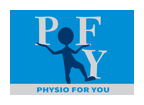MEDICAL EVIDENCE SHOWS THAT IF YOU KEEP PHYSICALLY FIT BY EXERCISING REGULARLY YOU INCREASE YOUR CHANCES OF LIVING A HEALTHIER LIFE – FEELING WELL, LOOKING WELL, MAITAINING YOUR LIFESTYLE. PHYSIOTHERAPISTS ENCOURAGE PEOPLE TO KEEP ACTIVE WITH SENSIBLE EXERCISES SUITED TO THEIR AGE AND PHYSICAL CONDITION.
WHY EXERCISE?
Strength and mobility – exercise helps to prevent stiffness in your joints and helps to strengthen your muscles.
Fitness and weight – exercise increases your heart rate and can improve your fitness by enhancing the efficiency of your heart and lungs.
Weight – exercise increases the amount of energy your body burns up and, in combination with a healthy diet, can help to control your weight.
Sleep – exercise can improve your sleep by increasing your sense of well – being and making you a bit tired.
Bone health and fractures – exercise is important in the prevention of osteoporosis, and can reduce the risk of falling by improving your balance.
IT’S NEVER TOO LATE
Everybody can exercise. The level of exercise will differ for each individual. Some seventy-year-olds climb mountains – others the same age will find much more gentle forms of exercise are appropriate. The important thing is to participate in activities that you enjoy and with which you can cope. Your physiotherapist can advise you on suitable activities.
WHAT IS BEST?
Increasing your fitness level means being able to do more with less effort.
Remember:
- Incorrect exercises can be worse than no exercise.
- The right exercises need to be done correctly and regularly.
- Monitor your progress e.g check for improved walking times or increased distances.
- Always warm-up and end with some muscles stretches – this helps prevent injury and stiffness.
- Wear sensible, comfortable clothes and shoes when exercising.
- Don’t over exert yourself. You should be able to talk or whistle whilst exercising, otherwise you are working too hard.


DIET
Hand-in-hand with exercise is diet. Attention to the food you eat makes a great deal of difference to general health. A proper diet gives you the energy for exercise. As you get older you may find you need less to eat and your appetite may diminish. Be careful not to become lax about your eating habits such as missing meals or not choosing a balance of protein, fibre and carbohydrates.
HOW PHYSIOTHERAPY CAN HELP
Physiotherapists are highly skilled in developing exercise programs to suit the needs of seniors. Although physiotherapists are particularly concerned with people who have a condition which limits them physically eg: arthritis, stroke, a fracture, osteoporosis or heart disease, healthy people can also benefit from seeing a physiotherapist.
Physiotherapists can tailor a program to suit your specific needs to optimise your physical function and fitness and can help you to remain mobile or improve your mobility.
Physiotherapists are trained specifically on physical aspects of the human body. They are highly qualified to advise you on an individual graded exercise programme and help you monitor your progress. In some areas, physiotherapists run special fitness classes for seniors. Check with your local branch of the Australian Physiotherapy Association (APA)
HEALTH REBATES
You may consult a physiotherapist either directly or by referral from your medical practitioner. Most private health insurance funds offer rebates for physiotherapy treatment. Physio For You offers on-the-spot HICAPS claiming.
Some patients are eligible for Medicare rebates for physiotherapy, contact us for more information.
WHERE DO I START
You need an exercise programme tailored to suit your level of fitness. Before commencing a new fitness programme, it is advisable to see your doctor for an overall check. A physiotherapist can assess you physically and give you advice on the best forms of exercise.
HOW MUCH IS ENOUGH?
Any extra physical activity you do will be good for your health, but the more you do (within your limits) the greater the benefits. Simple forms of activity such as housework and gardening can also enhance your fitness level if they are strenuous enough to raise your heart rate.
GROUP EXERCISE
Many people find that exercising with others helps them maintain motivation. There may be exercise classes in your local area designed for seniors eg: gentle exercise, strength training, Tai Chi, yoga or dancing.
WALKING
A basic, pleasant and effective activity – pace yourself, but the walk should be brisk enough to increase your heart rate, without overexerting yourself.
SWIMMING
An excellent form of general exercise which is not too hard on your body, but allows for plenty of movement with buoyancy – wonderful for bad backs or stiff joints. For those who cannot manage the cold or normal swimming conditions, hydrotherapy pools are recommended, but check with your physiotherapist first as this can be unsuitable for some people.
CYCLING
A low impact choice with no jarring on joints – an outdoor social activity or indoors on an exercise bike.
WARNING SIGNS
- Check that you can talk or whistle – if not you may be overdoing it.
- Check to see if your pulse rate returns to normal within 5 minutes of finishing your activity.
- Be careful of overheating or dehydrating during exercise.
- Proper rest is essential.
- Do not overdo it – watch for recurring or persisting pain.
- If you experience chest pain, stop exercising and see your doctor.
- If concerned, seek early professional attention from a physiotherapist.
- If you use Ventolin or Angihine take it with you when you exercise

